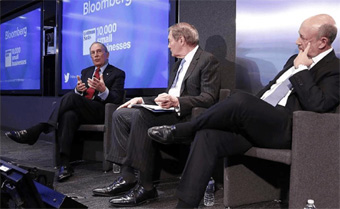
Michael Bloomberg (left) with CBS News' Charlie Rose and
Goldman Sachs CEO Lloyd Blankfein/photo courtesy Mike Bloomberg.com
Bloomberg Closer to
Presidential Run in 2016
| published February 8, 2016 |
By Keith H. Roberts, Thursday Review contributor
Former New York Mayor Michael Bloomberg may be inching still closer to making it official that he will seek the Presidency in 2016. Bloomberg recently told the Financial Times that he was unhappy with the level of discourse of both major U.S. political parties, and may seriously consider running as an independent or in a third party bid.
Late last year, Bloomberg fueled speculation about a possible independent run when he commissioned a poll to be conducted nationally to gauge his chances with voters. The results of that polling were never revealed, but other polls—conducted by independent groups and media organizations—have included Bloomberg’s name as a possible independent candidate and reveal that there may be some room for a third major candidate.
Bloomberg, who made his billions by developing a media empire—much of it centered on the financial sectors and Wall Street data—has commented publicly in recent weeks that he considers the current political debates of both major parties to be less-than-helpful to voters.
“I find the level of discourse and discussion distressingly banal,” he told Oliver Ralph, a reporter for the Financial Times this week, “and an outrage and an insult to the voters.”
Bloomberg said that Americans deserve “a lot better” when it comes to how presidential candidates address the real issues. But Bloomberg acknowledged that he will face an uphill struggle if he is to set in motion a national campaign in order to be ready for a general election now only a little more than eight months away. Some states require third party and independent candidates to meet qualifying criteria as early as mid-to-late March, and many states require significant signature campaigns to be conducted.
Rumors of a possible Bloomberg independent run have been circulating for several months. Bloomberg was known to have commented to friends and reporters repeatedly throughout the late summer and fall that he was troubled by Donald Trump’s easy ascension in the polls among Republicans. He has also commented to some on his own staff that he has been largely unhappy with the way the political conversation has evolved for Democrats.
Trump has addressed the talk of a Bloomberg candidacy bluntly, telling reporters he would easily beat Bloomberg in a general election. Bloomberg has slammed Trump and the narrative of the real estate mogul’s campaign, calling Trump “dangerous” and suggesting that a Trump presidency would represent a paradigm shift “from democracy to oligarchy.”
Political observers are divided on whether Bloomberg would pull more support from Democrats or Republicans, or whether he might take potential votes evenly from both parties. Bloomberg is a registered Republican who has run for mayor of New York twice as a Republican. He is generally considered a fiscal conservative and pro-business, pro-development. But he is also a deeply committed pragmatist who takes sharp exception with some traditionally conservative GOP positions, including gun control (Bloomberg favors much stricter gun laws in the U.S.), and health issues (Bloomberg favors aggressive government intervention in issues related to food labelling, fast food content and portions, and the dangers of sugar in foods and soft drinks).
Bloomberg is also a technologist and an environmentalist. Though he has in the past favored expanded oil and gas exploration in the U.S. coupled with robust energy sector growth, his position evolved in recent years; he now believes that climate change and global warming can only be halted by a rapid shift away from fossil fuels and toward green energy and better fuel technologies.
Those who know Bloomberg suggest that he would mostly self-fund his campaign using his personal fortune, estimated to be roughly $39 billion. Bloomberg told the Financial Times he would look at all his options between now and the end of February, then, possibly make a decision based on how candidates are faring among Democrats and Republicans.
Bloomberg’s more liberal inclinations on the environment and global warming, on food and diet and health, and on gun control, will likely make him somewhat unpopular with mainstream Republicans. On the other hand, it is not clear that progressives or liberals would be drawn easily toward his campaign: his economic views and fiscal views are sharply at odds with the rhetoric of Vermont Senator Bernie Sanders, and to a degree the center-left views of Hillary Clinton.
A Bloomberg path to the Presidency would largely come from voters’ general disgust with both parties and with the current crop of candidates in both fields. Historically, third party and independent candidates for President face extreme challenges in a system heavily pre-wired in favor of the two-party system. Few third party presidential candidates have made a dent in the traditional two-party template. Billionaire Ross Perot challenged the process in 1992, and despite pulling in about 19.3 million votes, he did not manage to capture any states or any electoral votes. George Wallace ran on a third party ticket in 1968, and did manage carry five states, along with 46 electoral votes.
Related Thursday Review articles:
New Hampshire Results Hours Away; R. Alan Clanton; Thursday Review; February 9, 2016.
Wall Street Takes Center Stage in Democratic Debate; R. Alan Clanton; Thursday Review; February 5, 2016.
